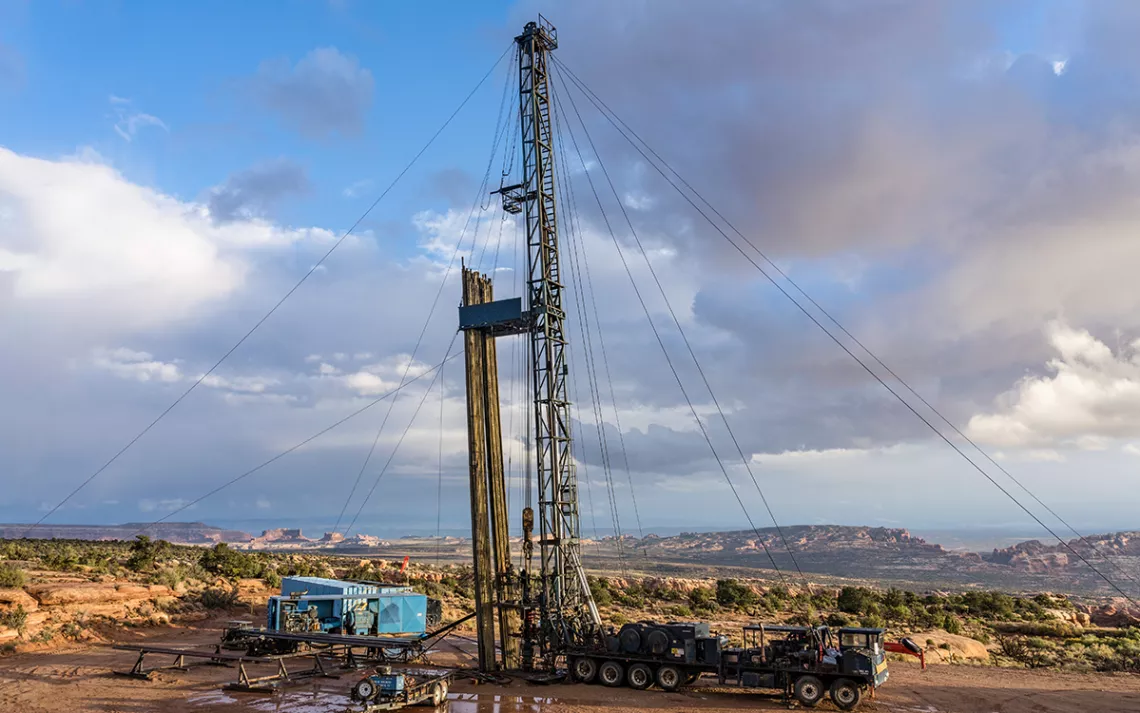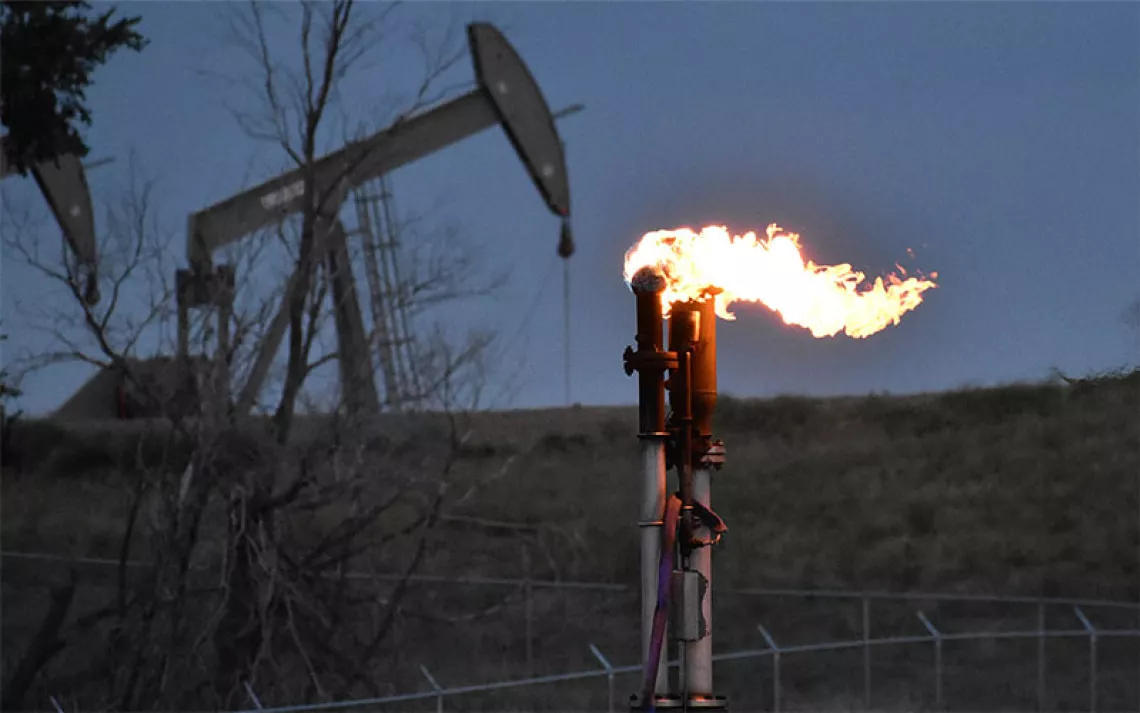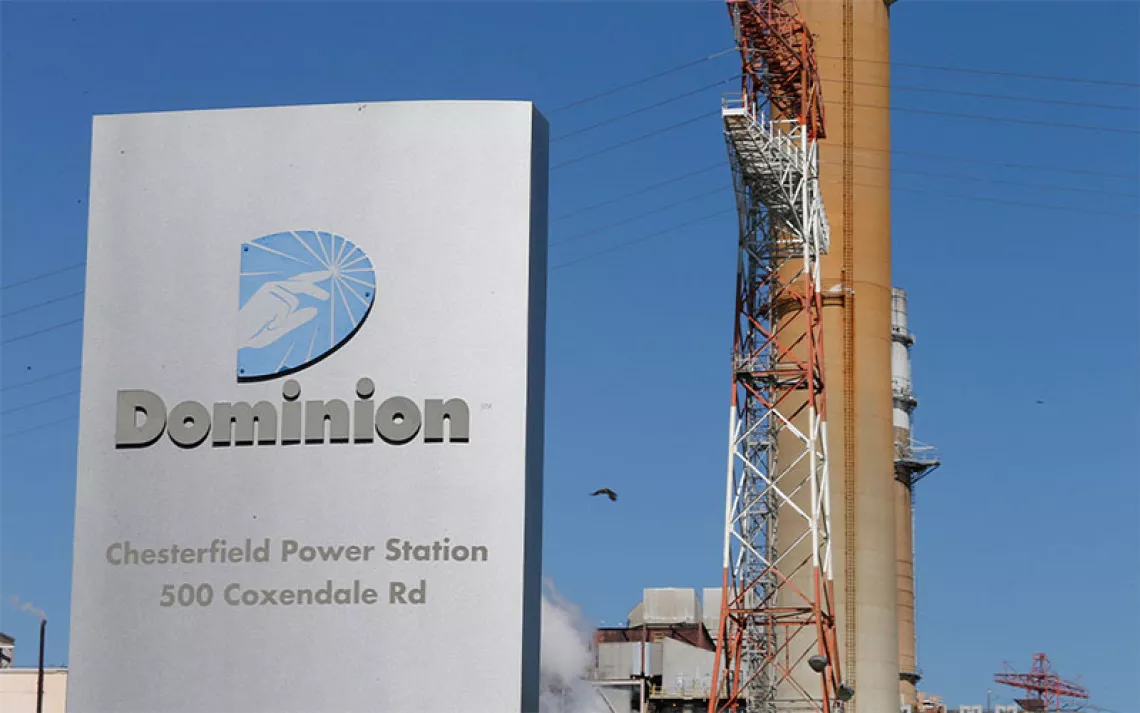The Dark Side of the Inflation Reduction Act
For all of its good, the new climate legislation also mandates oil and gas drilling on public lands

Photo by Jon G. Fuller / VWPics via AP Images
On a bluebird, late summer day in Washington, DC, President Biden and hundreds of environmental group leaders gathered on the White House lawn to celebrate the passage of the Inflation Reduction Act. The mid-September gathering was a worthy celebration, given that the act is the first federal climate legislation ever, and is poised to slash US greenhouse gas pollution by some 40 percent by the end of this decade.
But not all environmentalists are feeling so celebratory about the new law. Many people who live in communities near oil and gas extraction fields are feeling betrayed by the bill. Just a day before the White House party, dozens of environmental activists attended a public forum hosted by the Bureau of Ocean Energy Management to speak out against expanded oil and gas production—fossil fuel production that, in fact, is mandated by the IRA.
For more than a decade, the BOEM, which manages offshore drilling, has been trying to lease oil and gas extraction plots in Cook Inlet, which stretches 180 miles from the Gulf of Alaska to Anchorage. During that time, Alaska resident Sue Mauger and her organization, Cook Inletkeeper, have been fighting to protect the lower reaches of the inlet. Earlier this year, her organization helped garner some 93,000 comments opposing oil and gas expansion in those waters.
Much of Mauger’s efforts are for naught now that the IRA is law. In order to get buy-in from Senator Joe Manchin of West Virginia to pass the IRA, Senate Majority Leader Chuck Schumer agreed to provisions that mandate the sale of 11 offshore leases, one in Alaska and 10 in the Gulf of Mexico. Many of the country’s environmental justice and frontline community organizations opposed the landmark legislation because of such giveaways on public lands and waters.
“They heard from us, and it didn't really, ultimately, seem to matter. I can't think of anything that's more disheartening when you look at the health of our democracy, when peoples’ voices aren't really being heard anymore,” Mauger told Sierra. “I think it is a pretty cynical example of having certain politicians putting in their own special interests. That really is a bit of a slap in the face to people who actually live in these places where this new industrialization is going to happen.”
More resource extraction
Under the new law, the Department of the Interior cannot lease any offshore areas for wind energy development until it holds oil and gas auctions for at least 60 million offshore acres the preceding year. A similar deal was struck on land: The Department of Interior must lease at least 2 million acres of public land, or 50 percent of the acres nominated by industry groups, before expanding renewables like wind and solar.
Time constraints tied to the sales will likely force federal agencies to expedite environmental reviews at breakneck speed, which worries advocates like Mauger. She says the construction of oil rigs could harm species like the endangered Cook Inlet beluga whale while also impacting the local tourism industry. BOEM will release its final environmental impact statement this fall, before publishing a final notice 30 days prior to the sale, which has to happen before the end of the year. The 10 lease sales in the Gulf of Mexico must happen between next year and 2028.
What’s frustrating for frontline communities is that many of these extraction leases have been offered to the oil and gas industry before but have been rescinded or canceled. As recently as this past May, the Department of Interior withdrew a sale in Cook Inlet due to a lack of interest. With the new law directing BOEM to hold a sale by December 31, the agency released a proposed notice of sale late last month. In that document, the agency identified hundreds of blocks that it would like to lease.
In the Gulf of Mexico, an oil and gas leasing sale was canceled in January after a court found that BOEM failed to consider the impacts of greenhouse gas pollution. Now, the Biden administration is preparing to lease 15,148 blocks throughout the Gulf. The sudden reversal of these decisions is why people like Dustin Renaud, who lives in New Orleans, say this bill doesn’t feel like a win.
“The Gulf Coast communities are really fed up,” said Renaud, who is also the communications director at Healthy Gulf, an environmental organization that advocates for transitioning away from fossil fuels. “The gulf has been used as a bargaining chip … for years for the oil and gas industry. This is just the latest assault against our communities.”
There are already more than 53,500 oil and gas wells in the Gulf of Mexico that annually produce 21 billion barrels of oil and 189 trillion cubic feet of gas. In Cook Inlet, BOEM thinks that over 430 million barrels of oil lie under the inlet. Since production began there, the industry has extracted nearly 1.5 billion barrels and 5 trillion cubic feet of natural gas, reports Cook Inletkeeper.
And that’s just a snapshot of fossil fuel production on federal lands and waters. Oil and gas extraction is prioritized on 90 percent of public land managed by the Bureau of Land Management, the Wilderness Society reports. A recent analysis by the Center for American Progress found that 78 million acres of public lands are actually suitable for renewables but are still available for leasing by the oil and gas industry, despite having minimal oil and gas production. In open waters, more than half of the 1.7 billion acres are prioritized for oil and gas, says the center.
More important, one of the center’s analyses found that expanding oil and gas production won’t do many of the things that elected officials like Manchin believe it will do, such as lowering gas prices. The industry already has millions of acres of land and water under lease that aren’t being used. Furthermore, it would take years for new leases to result in production, which means no ostensible gasoline price drops would benefit consumers today.
Jenny Rowland-Shea, CAP’s director for public lands, says that the entire system of leasing on public land is designed to make it easy for the oil and gas industry. Allowing industry professionals to nominate areas to drill for free, letting them lock up land and exclude other uses, and selling land to them for $1.50 per acre all lead to an industry that has run roughshod over other potential uses and users.
“The Inflation Reduction Act reformed many of these pieces of the broken oil and gas system and now force polluters to pay their fair share—which is really good,” Rowland-Shea said. “But then there are the so-called compromise pieces that are just bad policy, and they are in what is an otherwise very strong bill.”
Sacrifice zones
In some regards, the IRA made badly needed reforms to fossil fuel extraction on public lands. Companies will now have to pay $5 per acre to nominate land—up from $1.50 per acre. Starting next year, companies will have to pay a $900 per metric ton of methane emitted from their operations—a figure that rises to $1,500 after two years, but such tweaks don’t really get at the heart of the issue, which is that oil and gas production is overheating the atmosphere while also causing localized pollution.
In its draft environmental impact statement for Cook Inlet, BOEM estimates that there’s a one in five chance an oil spill will occur. And the agency figures that over 88 million tons of carbon dioxide would be released during the lifetime of the project. In its previous environmental impact statement, the agency estimates that oil production in the Gulf of Mexico will create nearly 1 million tons of greenhouse gases every year for half a century.
Renaud and others in neighboring states, such as John Beard, the executive director of the Port Arthur Community Action Network, say they’ve been offered up as sacrifice zones so that climate progress can be made elsewhere, for other people. Annually, over 2,000 spills occur in the Gulf of Mexico, according to Healthy Gulf, releasing over 300,000 gallons of oil into the water. Cook Inletkeeper has reported that in state waters where oil and gas leasing already occurs, nearly 700 spills have happened in the last 25 years.
Beard, who worked in the petrochemical industry for almost 40 years, said that fossil fuel companies come to frontline communities with the promise of jobs and prosperity, but those promises belie a hidden truth: Oil and gas companies are seeking profit, not community building. And often those profits come at the expense of public health. In Jefferson Country, where Port Arthur is located, the cancer mortality rate for African Americans is nearly double that of the rest of Texas, and almost 20 percent of the population suffers from a form of lung disease. The American Lung Association gives the county an F for ozone levels.
“All of the talk of environmental justice, of being the environmental president, of doing the most for impoverished communities and impacted communities, just seem to be mere words,” Beard said. “They see us as charity, and as fodder for them to make billions in profits, while our communities and our cities, our homes and our health are sacrificed and treated … as though they have little worth of value.”
What comes next
For all of the gut-wrenching giveaways to the oil and gas industry, experts who are familiar with fossil fuel leasing point out that the IRA only requires federal agencies to conduct lease sales. Whether oil and gas companies will bid on those sales is a completely different question. Historically, it’s rare for the total amount of acres put up for sale to be sold to producers. Sale 257, in the Gulf of Mexico, is a case in point. While the block totals approximately 80 million acres, only 1.7 million acres were actually leased before the sale was canceled by the lawsuit earlier this year.
“If they offer 60 million acres to lease, they meet the requirements of the bill,” said Brett Hartl, the government affairs director at the Center for Biological Diversity. “That doesn't mean an industry is going to buy up all 60 million acres, right? Because then it's like, industry could totally unilaterally control the fate of the renewable energy industry.”
BOEM recently released its new five-year plan for offshore drilling, and while the new legislation supersedes agency action, Mauger is once again hoping that communities will weigh in. At this point, she says, the sales are going to happen, but there are ways to mitigate the damage, such as closing a loophole that allows companies to dump waste in the inlet, that she hopes the agency will consider.
“I think people are ready for the type of incentives that the federal government has given oil and gas companies for decades—ready for that to now be shifted to renewables,” Mauger said. “To have these oil and gas lease sales at this point in time is very disheartening. It does suggest that … the corporate lobbyists are as powerful as they’ve ever have been.”
 The Magazine of The Sierra Club
The Magazine of The Sierra Club



